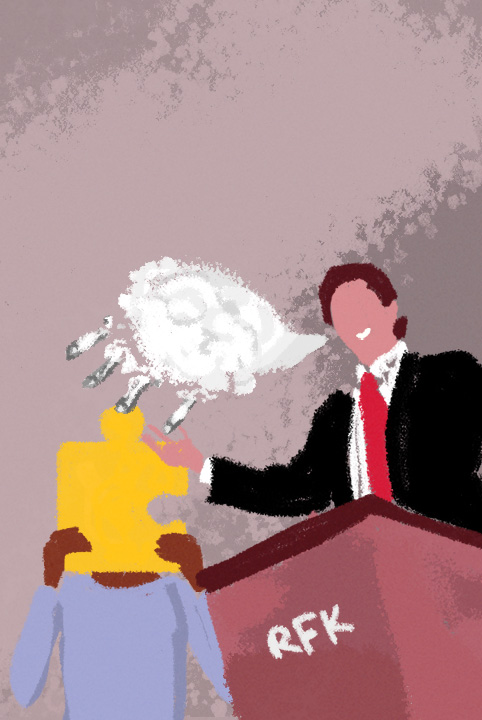Savouring the unsavoury
Some albums aren’t easy to listen to, let alone write about. That’s not to say they shouldn’t be listened to or written about. Prolific producer and remixer Black Dog and Paris-based poet and spoken word artist Black Sifichi’s collaboration Unsavoury Products is a 60-minute album that requires multiple listens to soak up. Sifichi’s gruff monotomic socio-political rants are a fine bedfellow to the Black Dog’s abstract, often Arabic-influenced soundscapes. The words float by like a percussion instrument and occassionally jump out with ideas that are dark, funny, poignant and mysterious. The music is noticeable at times, and barely there at others.
U.P. is an homage to William S. Burroughs, and while the cut-up prose is reminiscent of the late poet, this product stands on its own. The Black Dog collaborated with Burroughs prior to his death for a forthcoming release and the late author’s artwork appears in U.P.
In an attempt to understand this thought-provoking and emotionally draining album further, I turned to the Web site unsavouryproducts.com. It’s set up as a mock commercial site and is pretty funny. They’ve fortunately included a “virtual review engine” that provides handy descriptive phrases for frustrated press folks. I couldn’t fill the page with insights about “embracing strange onanism” and “transforming musical indulgence,” so I turned to Black Sifichi himself for some knowledge.
Black Sifichi: If people think of something from the record when they aren’t listening to it – when they are on the train or walking on the sidewalk – and a phrase or atmosphere from the record comes to mind and helps that person to see and feel more clearly the moment they are existing in and make them more tender, that would be an accomplishment. If society stops bluffing itself, that would also make me happier!
Let’s get adult about the world. We are at a critical point in human development. Cheap entertainment isn’t the answer. We are a globe, not a country. I would like to see a bit more of this kind of thinking, and Unsavoury Products is our reflection of this.
Can music bring about social change?
Black Sifichi: Yes, music can definitely bring about change, as history proves. All through this century, from Woody Guthrie, Vladimir Vissotski, Boris Vian, Gil Scott Heron, The Last Poets, Linton Kwesi Johnson, The Clash, Fayrouz, Berurier Noir, Jose Menese, Bob Marley, John Lennon and so many other artists have influenced the world in ways far more powerfully and deeply than any political systems or any other media. Sometimes art can be the most potent and effective way to express a political message to the public. A perfect example of this being Picasso’s reaction to the massacre at Guernica, under the Franco regime. A million protestors flooded the streets of Paris to express their outrage, and Picasso immediately reacted by creating his most powerful and expressive mural, “Guernica”.
Is there anything new that can be done in music?
Black Sifichi: Absolutely, although few seem to be trying! There is always “the invisible” out there. I think we’ve done that on Unsavoury Products to some degree. I believe The Black Dog have been doing this since the start of the Dogsquad and their days at Warp (records). For U.P., occassionally some of the criticism we’ve received reveal the “newness” in an oblique way – for example, The Wire described “a lack of interplay between the voice and the music” and by contrast, Grooves Magazine stated “the balance is just right, the music emphasizes the mood of the spoken elements perfectly.”
This just exemplifies the standard nature of formatting in modern music. In a normal song/structure the voice would have a different or normal type of placement/rhythmic interplay. On U.P. everything has been done with a different perspective to both vox and the music, the approach comes more from an open minded artistic stance than a purely musical one, and it requires the listener to be equally open minded. It comes from doing a work collectively. The sound is designed to provoke an emotive response and not just an aural one.
With computers, the future is really open, the interface between the imagination and different possibilities have been drawn closer together. People have to continue searching for new reasons for making music, it cannot continue to just be another ‘product’ for the market, then the sounds will continue to change and the music will evolve, organically.
Music and culture together.
Black Sifichi: Music is culture. Writing is culture. A reflection is a reflection. Art shouldn’t distort, it should shoot straight for the heart.
Do you consider yourself to be a postmodern artist?
Black Sifichi: I consider our times to be postmodern, but not myself. I’m antique. I could exist in any time and any century. Thought and human expression should go beyond time and place. I think that’s what we’re doing.
What are some of your creative inspirations?
Black Sifichi: From all branches of art and culture: electronic musicians and creators like The Black Dog, B. Friedmann, Norscq, Pole, Janek Schaeffer, Christian Marclay, Coil, Pansonic; the art group Dix 10, Joseph Bueys, Letgo & Audacity, Duchamp; writers William Burroughs, John Giorno, Bart Plantenga, Mark E. Smith; the weird theatrical – audio creations by Blue Jam, The Firesign Theater, Lenny Bruce; different musics, notably dub and ambient; Satie, Miles Davis, Hal Wilner, David Byrne, Joy Division, Wire, Bob Dylan, Funkadelic, Tom Waits, Liquid Liquid. And many more, and I know The Black Dog’s list is even crazier!




